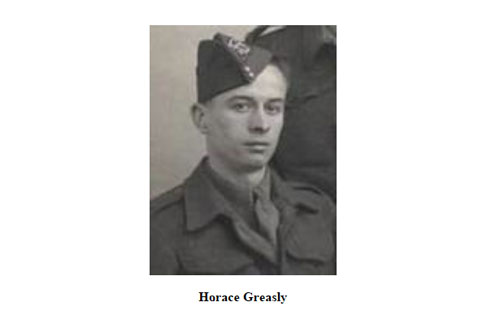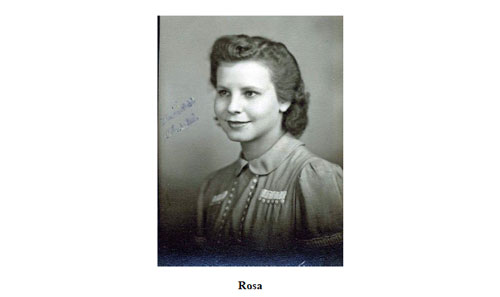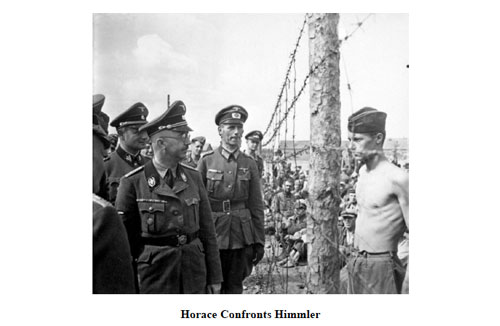
Chapter 16

Horace Greasley was born on Christmas Day in 1918 along with twin brother Harold, to Joseph and Mabel Greasley. The Greasley twins grew up in the village of Ibstock, where they worked on their family’s farm.
Horace and Harold were inseparable and both boys were popular with the girls of the village not only for their good looks but their bravado bordering on larrikinism. Both enjoyed working on the family farm where they kept dairy cattle and pigs. In both their minds living on a farm for the rest of their lives would suit them down to the ground.
Circumstances changed, the farm could not sustain them all so Horace left the farm to become a hairdresser. He was cutting the mayors hair when news came in that Hitler’s army had invaded Czechoslovakia. He knew immediately that he would be liable to be called up along with Harold. They were both conscripted in the first draft.
Soon after his call up notification was received a regular client offered to get him a job as a fireman, a reserved occupation which would actually pay better than joining the services and would keep him out of the firing line. Horace turned the offer down.
Both twins trained with the 2nd/5th Battalion Leicestershire Regiment and were dispatched off to France as part of the British Expeditionary Force. Horace and Harold had no idea what they were in for.
The German and Allied forces were roughly evenly matched. The Germans offensive fielded one hundred and thirty six divisions against ninety-four French divisions, and ten British divisions of the British Expeditionary Force. Twenty-two Belgian and nine Dutch divisions completed the allied forces. The numbers of tanks fielded on each side was also approximately equal. It was only in the air that the Germans enjoyed massive superiority: two thousand five hundred aircraft against a few hundred British, and largely obsolete French aircraft.
The quantity of the Allied troops was fine; the quality was not. Britain and France had been largely unprepared for war, and the training of their conscript armies was abysmal. In Britain, ammunition shortages meant each recruit was allowed only five rounds in total for rifle training. The French conscripts were even less trained.
Fortunately, the small British Expeditionary Force had many professional troops to reinforce the recent conscripts.
By contrast the Germans had had much more intensive and elaborate training. Hitler knew there would be a war! Accurate, full-scale mock-ups of crucial fortifications were built in Germany, and troops rehearsed their attacks until perfect.
The Allies were defeated, the High Command knew they had to evacuate over three hundred and fifty thousand men including the British French and Belgian divisions who were trapped in the port of Dunkirk. The British decided to evacuate them by sea. Initially, they believed that they would be able to rescue, about thirty thousand men. Over the course of ten incredible days from May 26 to June 4, they accomplished a magnificent feat. The navy put out a call for help from the civilian population and boats from all over Britain began appearing Fishing boats, yachts, pleasure boats, rowboats, all answered the call. Under constant aerial attack the navy and civilians evacuated nearly Three hundred and forty thousand men. They had to leave behind all of their heavy equipment but that could be replaced. When it was over, Britain still had an army with which to fight another day.
For every seven soldiers who escaped through Dunkirk, one man was left behind as a prisoner of war (POW). The majority of these prisoners were sent on forced marches into Germany. Horace was one of those captured.
What followed was a ten week forced march across France and Belgium to Holland and a three-day train journey to prison camps in Polish Silesia, then annexed as part of Germany. Many died on the way, Greasley reckoned himself lucky to have survived.
In the second POW camp to which he was assigned, near Lamsdorf, he encountered the seventeen year-old daughter of the director of the marble quarry to which the camp was attached. She was working, as an interpreter for the Germans There was a mutual attraction between Horace and this beautiful young girl.
Within a few weeks Horace and Rosa were having an intimate relationship right under the German’s noses. They would meet in all sorts of hiding places including the camp work sheds; nothing would dampen their lust for each other. Unfortunately after one year of their relationship Horace was transferred to Freiwaldau, an annex of Auschwitz, some forty miles away.

There was only one way to continue their lustful relationship, break out of his new camp. Security at Freiwaldau was not very tight as it was located on the border of Germany and Polish Silesia; there was little hope of escaping back to Britain. The nearest neutral country was Sweden, four hundred and twenty miles to the north.
Greasley reasoned that short absences could be disguised or go unnoticed. Messages were exchanged between him and Rosa via members of village work parties and handed to Horace, the camp barber, when they had their hair cut.
Horace, with the help of mates, would go under the wire to meet Rosa, they made wild passionate love and he would break back into the camp under the cover of darkness.
Greasley recalled that in some weeks he made the return journey three or more times depending on whether Rosa’s translation duties brought her close to his camp. His proven bravado to continue their love affair was not the only testimony to his daring.

This photograph shows Heinrich Himmler, head of the SS, inspecting a prison camp and a shirtless skinny POW close to the fence confronting him. The prisoner was Horace Greasley; he is shown with his shirt off demonstrating to Himmler that they were not being fed enough and that all the POW’s were as thin as he was.
Horace had no idea who Himmler was but survived the introduction. The food rations were not increased. Rosa did help with his nutrition by giving him food parcels to take back to the camp, she also smuggled radio parts, which enabled the prisoners to keep up with the news by listening to the BBC.
Horace broke out of camp two hundred times. He broke back in two hundred times. This made Horace Grimsley the greatest escapologist in history!
Horace was held in captivity for five years, he was finally liberated on 24 May 1945, he returned to Britain and continued the relationship with Rosa via letters soon after the war, he even provided her with a reference allowing her to work as a translator for the Americans.
Sometime after Horace returned home he received the very sad news that Rosa had died during childbirth, the newborn died as well. Although Rosa never told him of her pregnancy, he knew in his heart of hearts that the child was his. Horace was heartbroken.
The love affair conducted with Rosa was a dangerous one not only because of the constant danger of the escapes but unknown to Horace she was Jewish. If the authorities had discovered her ancestry both would have been hanged.
Horace and Rosa proved the adage “Love Conquers All”